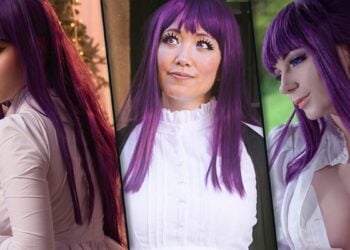Japanese animation has been a huge influence on the West over the years, and there are many ways that American media has reflected that influence, from the anime-style Colonel Sanders to the Powerpuff Girls to The Matrix. But no country is an island, even an island nation like Japan, and there are many ways that anime and related culture has been influenced by the West. In the Japanese dub of Bewitched, Samantha’s husband Darren was named Darling, for phonetic purposes similar to why Americans think banzai and the bonsai trees are the same, and Lum calling Ataru her “darling” in Urusei Yatsura is a reference to this. Many anime series of the 80s have included tributes to the final scene from the film The Graduate, a long-running joke that pops up repeatedly. Increasingly, the popularity of anime outside of Japan decides the flow of things here. For example, manga-ka (comic artist) Shirow Masamune and Akira director Katsuhiro Otomo attained god-like status when their works exploded outside of Japan, and the popularity of Dragonball and Saint Seiya in the U.S. caused them to experience a revival in Japan, too.
Language is ever-flowing, always in motion, and it’s always interesting to see what slang words become popular here. One year everyone was saying Bye Bye-Kin (“bai bai-KEEN”), popularized by a Listerine commercial that combined the English word “bye bye” and baikin (bacteria), the next everyone was saying “oh-HA!!” as the morning greeting instead of ohayo. The slang that’s bouncing around these days is also fun to pay attention to. Since Japanese verbs usually end in ru (for example, taberu, “to eat”), some Tokyoites have invented a new word, caferu (cafe + ru), meaning “to enjoy a cup of coffee in a cafe.” Another word you hear in the aftermath of the recent Japanese election is the Evangelion-esque Koizumi Children, referring to the young politicians who rode Prime Minister Koizumi’s coattails into office over the Postal privatization issue. The most popular drama of the year was Densha Otoko (“Train Man”), and a lot of this year’s words are “Akiba-kei” (related to the otaku culture you find in Tokyo’s Akihabara area), such as moé (mo-EH) which refers to the passion fans feel for the manga or anime that they love, and Kitaaa!! (“Yes, this is it!”), which you can see on our Mona Neko shirts. Finally, comedian Masaki Sumitani has created a rather odd on-camera personality called Razor Ramon HG (you might not want to know what the “HG” stands for), who does a silly dance and shouts “Foh!” Currently Japanese from elementary schools to the elderly are hooked on this strange word, and imitate him often.
Last time we posted the new Hello Kitty soft acrylic blankets, which are extremely luxurious and stylish. Today we’ve got another treat for you: My Neighbor Totoro blankets featuring one of the most famous characters in all anime-dom. There are three sizes of blankets on the site — full sized for use on a bed, a half sized blanket that’s great for curling up in front of the TV with, and a handy lap blanket.
J-List works hard to bring you the fascinating PC dating-sim games from Japan, translated into English and great for fans of bishoujo (“pretty girl”) games all over the world. Today we’ve added convenient sets of games by Peach Princess to allow you to buy these great games and save. There are three sets to choose from: X-Change 1 & 2, the Crowd set (which add Tokimeki Check in! and Brave Soul), and the Will set (four games by Will).
J-List is ready and eager to serve you this holiday season, and our hardworking Japanese and U.S. staff are ready to speed your order out to you with speedy speed. Please browse our stock and let us know what we can do for you?















